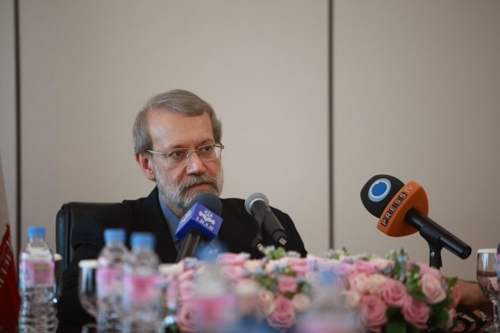Iran's parliamentary speaker said Thursday that Tehran will seek to use its ties with North Korea to help improve inter-Korean relations for a "peaceful and political" solution.
During an interview with Seoul-based reporters, Ali Larijani also cautioned against the two Koreas taking actions to trigger any military rivalry and threw his support behind South Korea's Moon Jae-in government pursuing dialogue with its provocative neighbor.
 |
Iran`s parliamentary speaker Ali Larijani attends a press conference at a hotel in Seoul on June 29, 2017 in this photo provided by the Iranian embassy in Seoul. (Yonhap) |
"We believe we should make use of our bilateral relations (between Tehran and Pyongyang) in order to resolve the problems. If it is possible for us, we will explore our capacity and capabilities in order to improve the relations between the two Koreas," he said.
"(Military) actions would create military confrontations. ... Instead, we should develop and promote political discussions," he added, noting Tehran's foreign policy is based on the peaceful resolution of any external problems.
Larijani was visiting Seoul to attend the Meeting of Speakers of Eurasian Countries' Parliaments that ended Wednesday. The conference on cooperation for shared prosperity was jointly hosted by South Korea's parliament and the State Duma, the lower house of Russia's legislature.
Asked to comment on the upcoming summit between South Korean President Moon and his US counterpart Donald Trump, the parliamentary chief called for consistency in US foreign policy, indicating that Washington has oscillated between its two Middle East partners now in a diplomatic crisis -- Saudi Arabia and Qatar -- to advance its economic interests.
"While Saudi Arabia imposes some sanctions against Qatar, on those days, the US stood behind Saudi Arabia. But when they finalized a very big agreement on F-16 aircraft with Qatar, they changed their own policy," he said.
"I believe it is not suitable for the foreign policy of a country to be done in the form of some business transactions. Of course, it is not becoming of the dignity of the US," he added.
Asked to comment on the oppressive nature of the North Korean regime, Larijani said his Islamic republic favors a democratic system, but it is "up to the people of North Korea."
"But in different parts of the world, in different countries, different systems are established. Of course, here we are not going to talk about moral issues," he said.
Touching on the relationship between Iran and the North, he said the two countries now have "some regular" relations but do not have any significant trade ties. (Yonhap)








![[Today’s K-pop] Blackpink’s Jennie, Lisa invited to Coachella as solo acts](http://res.heraldm.com/phpwas/restmb_idxmake.php?idx=644&simg=/content/image/2024/11/21/20241121050099_0.jpg)